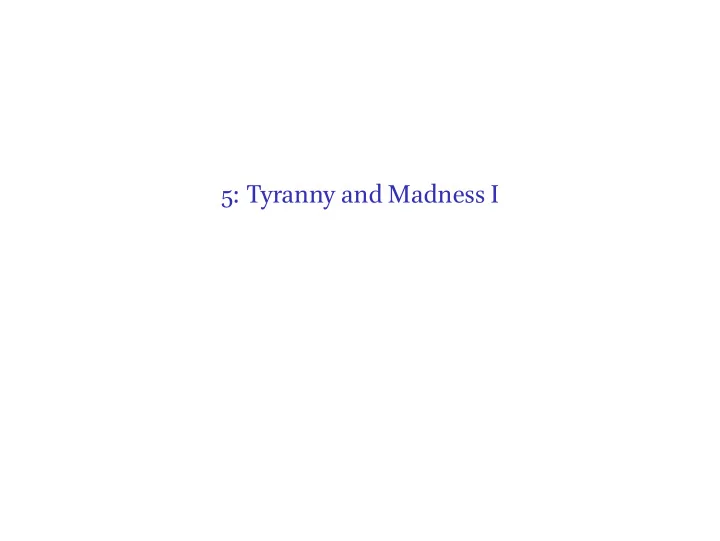

5: Tyranny and Madness I
Barrett on Caligula “ The Roman senate soon came to regret that they had so enthusiastically handed over supreme power to a personable but totally inexperienced young man. Fewer than fifteen years later they went through almost the same ritual, and endured under Nero an extended reprise of what they had already suffered. (Barrett, Caligula , 2) ”
Barrett on Caligula “ The opportunistic philosopher Seneca, seeking to curry favour with Caligula’s successor, Claudius, assured that emperor that Caligula had ‘wasted and utterly destroyed the empire’. This is patently untrue. It seems clear that under Caligula the Roman provinces generally enjoyed stable and orderly government: the frontiers were secured, Rome reached a workable understanding with its old enemy Parthia, and German incursions into Gaul were stemmed. (Barrett, Caligula , 2) ”
Barrett on Caligula “ He supposedly cut a ridiculous figure by engaging in battle alongside his troops. But Claudius was inspired to follow his example four years later when he notionally led his troops to victory in Britain. Caligula allegedly left Rome utterly bankrupt. But Claudius found the state of the treasury so healthy that he was able to abolish taxes and engage in expensive building projects. […] And the reaction of ordinary people to the death of this supposed bloody tyrant was not jubilation, but anger. (Barrett, Caligula , 2–3) ”
Barrett on Caligula “ His successor, Claudius, found himself in a very delicate, and complicated, situation when he became emperor. His elevation had come about as a result of his predecessor’s murder. He would clearly have wanted to minimise the risk of setting a dangerous precedent, and it was very much in his interest to promote the notion that the reason why Caligula had been assassinated was not because the imperial system, a recent innovation for Romans, was inherently undesirable, but because the mentally incompetent Caligula was an unfortunate aberration. (Barrett, Caligula , 3) ”
Barrett on Caligula “ The literary sources may well have tarnished his true image, but that true image was scabrous and corroded well before the process of deliberate tarnishing began. We are entitled to expect more than just an absence of madness in our rulers […]. Few who knew Caligula well seem to have regarded him highly, not even members of his own family. […] Caligula was admittedly popular with the masses, but […] they knew nothing about him, apart from his flamboyant showmanship. He was clearly an appalling ruler. (Barrett, Caligula , 7) ”
Suetonius on Caligula “ So much for Caligula as emperor; we must now tell of his career as a monster. (Rolfe, Suetonius , 1:435) ”
Suetonius on Caligula “ He even used openly to deplore the state of his times, because they had been marked by no public disasters, saying that the rule of Augustus had been made famous by the Varus massacre […]. [A]nd every now and then he wished for the destruction of his armies, for famine, pestilence, fires, or a great earthquake. (Rolfe, Suetonius , 1:453–454) ”
Caligula on Caligula, according to Suetonius “ Let them hate me, so they but fear me. (Rolfe, Suetonius , 1:453) ”
Debate “ Government ought to be centrally guided by utilitarianism/ consequentialism ” “ Government ought to be centrally guided by moral principles ”
Bibliography Barrett, Anthony. Caligula: The Abuse of Power . 2nd ed. London: Routledge, 2015. Rolfe, J. C., ed. and trans. Suetonius . 2 vols. Loeb Classical Library, 31, 38. London: Heinemann, 1914. P. S. Langeslag
Recommend
More recommend